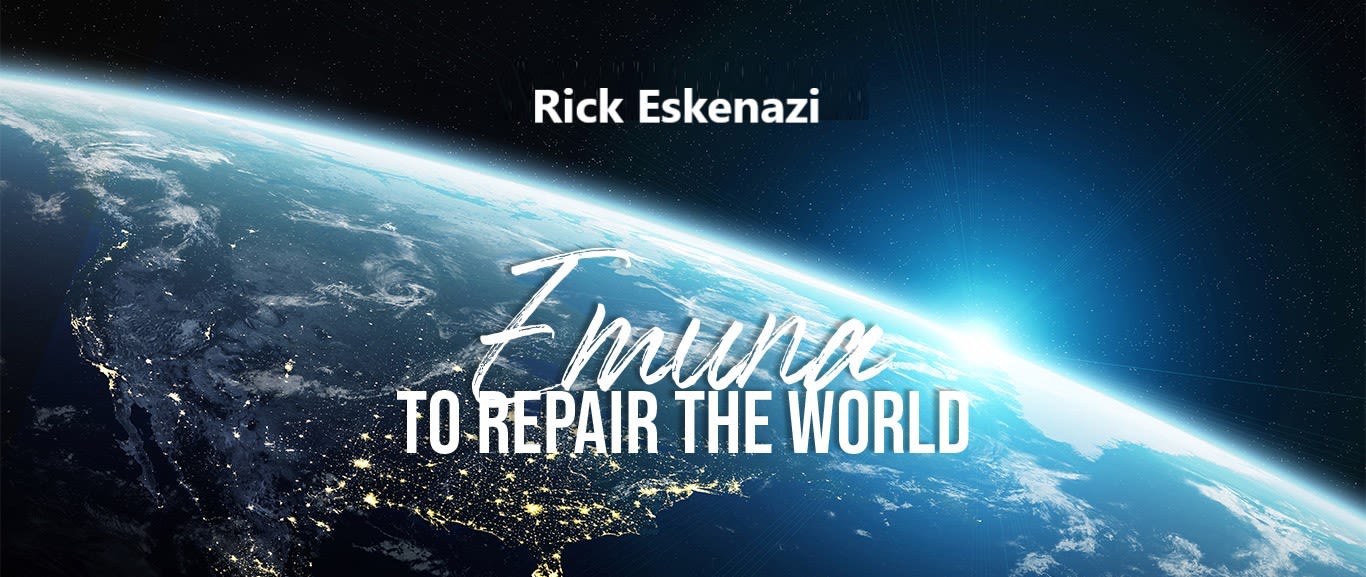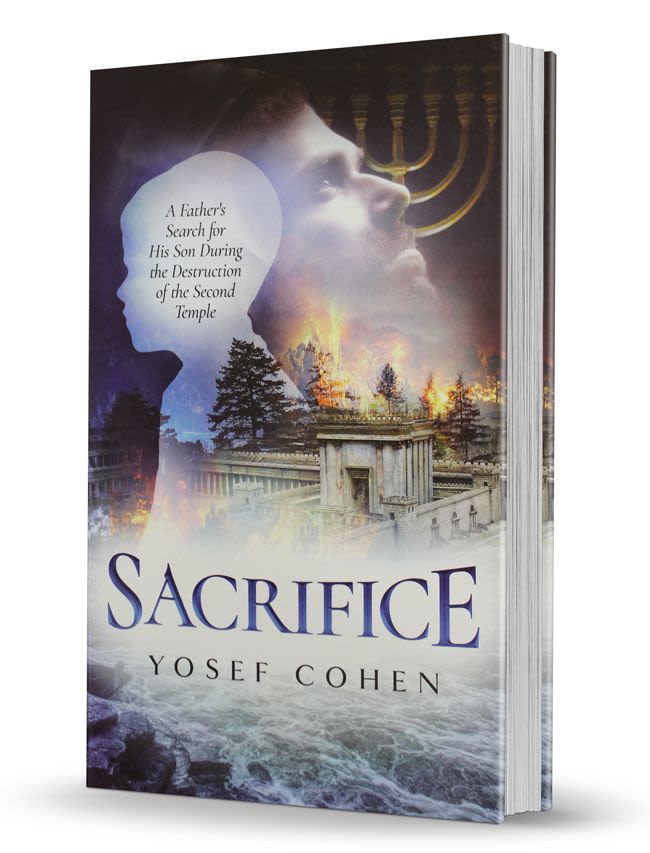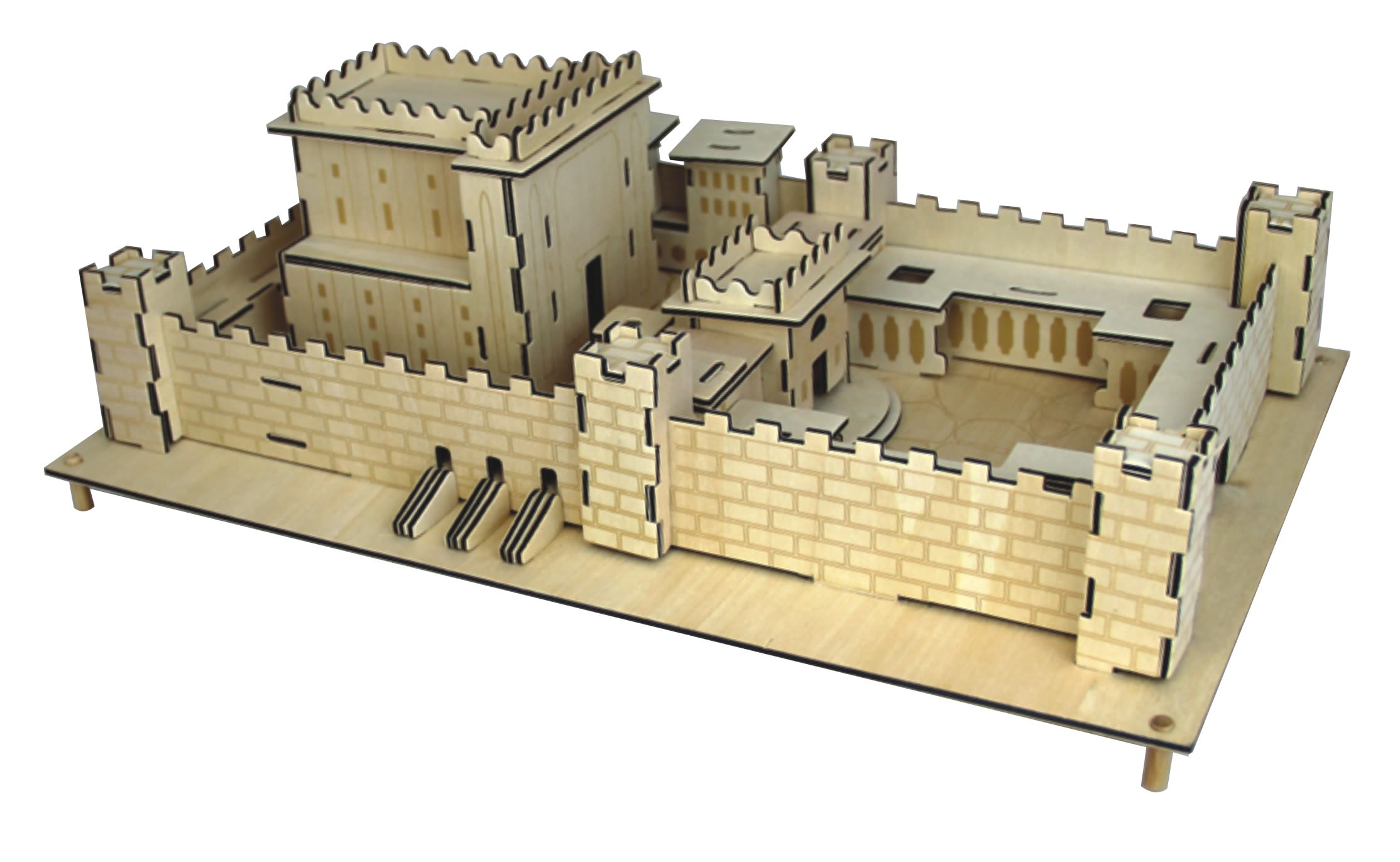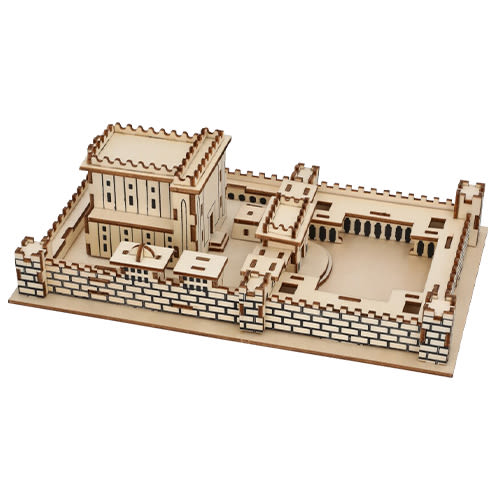
Emuna, To Repair the World
Things around us look really scary, but Moshiach doesn't necessarily have to come after a nightmarish push-button war; there's a better way to bring the Geula...

The sages teach that the people of Israel lost the first Holy Temple, by committing three cardinal sins, murder, idolatry, and sexual immorality. The punishment for these serious offenses was the loss of our first Temple for seventy years. However for the sin of “baseless hatred”, and speaking slander or lashon hara, as it is described in Hebrew, our sages teach that we lost our second Temple nearly 2,000 years ago and we are still waiting for it to be rebuilt!
The Jerusalem Talmud states that in any generation in which the Temple is not rebuilt, it is as if that generation had destroyed the Temple. We are taught that in order to receive our third Temple, and merit the coming of the Messiah, we must correct those behaviors that first led to its destruction.
We can therefore see that the mission of the Jewish people is multifaceted.
We must make this world a better place, by: 1) teaching G-dly values to the world, 2) stop speaking slander, and 3) practice baseless love, rather than baseless hatred. As if that is not enough, there is at least one other important tikkun, or repair that the Jewish people must do.
In the Torah there are two places where we read the blessings and curses that can befall the Jewish people.  The section where the curses are read are so painful that when they are read in the synagogue, the cantor lowers his voice so as to not scare or depress the congregants. Unfortunately, many of the curses have already occurred during the period when our Temples were destroyed, as we read on the Ninth of Av in the book of Lamentations.
The section where the curses are read are so painful that when they are read in the synagogue, the cantor lowers his voice so as to not scare or depress the congregants. Unfortunately, many of the curses have already occurred during the period when our Temples were destroyed, as we read on the Ninth of Av in the book of Lamentations.
When the curses are stated the second time in the book of Deuteronomy, one important reason is given for the curses. The Torah says, “because you did not serve G-d with joy, and gladness of heart in your abundance, you will serve your enemies…” Thus a fourth correction or Tikkun for the Jewish people is the requirement to serve G-d with joy, showing gratitude rather than offering complaints.
By working on these four areas where we have missed the mark, (which is the actual meaning of the word “sin” in Hebrew) we can repair the reasons that caused the loss of our Temple, preventing the coming of the Messiah.
Some might ask, what’s the rush? After all, it has been nearly 2,000 years since the loss of the second Temple. The sages teach that the Messiah will come “in his time”, so what’s the point of working hard to repair the world, when we can live our lives as always, taking care of our own needs, enjoying life the best we can. After all, working on these four areas would require us to step out of our comfort zone, teaching Jews and non Jews alike G-dly values, giving our fellow humans the benefit of the doubt, without carrying a grudge, as well as doing the near impossible, serving G-d constantly with joy and gratitude. For a “stiff necked people” as we are described in the Torah, these are not easy tasks to accomplish. So again, given the difficult nature of the task, what’s the rush?
To understand why we might want to “rush” to make these repairs, we must venture into the land of end times prophesy. In Isaiah 60:22 a phrase is used that our sages say refers to the coming of the Messiah. It says, “in it’s time, I will hasten it”. This seems like a confusing statement to many, as it implies that the Messiah will come at a set time, but then it adds, “I will hasten it.” Just what does this cryptic statement mean? If we look into the Talmud, we can find an explanation. Rabbi Yehoshua Ben Levi says, ” if they are worthy, I (G-d) will hasten it, if not, he will come at his due time.” (Sanhedrin 88a) In other words, if Jews make themselves worthy, the Messiah can come before his set time.
This Talmudic statement is helpful, but when, specifically, is the set time, and why would we want to speed the coming of the Messiah?
Our sages teach that the length of time for the existence of our world is based on the template of the days of our week. From Genesis we learn that the world was created in six days, and then G-d rested from his creative activity on the seventh day.
It is said in Bereshit Raba 19:14, based on Psalms, ” A day of the Holy One is a thousand years.” and in Sanhedrin 97a it further says, ” For six thousand years shall the world exist.” Thus the final Temple must be rebuilt and the Messiah must come by the year 6,000, although as the sages imply, he may come earlier depending on our behavior. How is this so?
Zachariah describes a time just prior to the coming of the Messiah when the 70 nations will make war with Israel, resulting in the potential death and suffering of millions of Jews. Zachariah states, “A day of the LORD is coming when your plunder will be divided among you. I will gather all the nations to Jerusalem to fight against it; the city will be captured, the houses ransacked, and the women raped. Half of the city will go into exile, but the rest of the people will not be taken from the city.”(Zechariah 14:1-2)
Just when things look to be their bleakest and Israel is about to be destroyed, a turnabout occurs, and in the end, Israel triumphs, ushering in the Messiah, but with great pain. Zachariah states, “This is the plague with which the LORD will strike all the nations that fought against Jerusalem: Their flesh will rot while they are still standing on their feet, their eyes will rot in their sockets, and their tongues will rot in their mouths. On that day men will be stricken by the LORD with great panic. Each man will seize the hand of another, and they will attack each other…” (Zechariah 14:12-14)
This time period is so painful that one of the Rabbis of the Talmud says about being alive when the Messiah comes, “may he come, and let me not see him.” (Sanhedrin 97b) If the Messiah comes, “in it’s time”, this will occur at the latest in the year on the Hebrew calendar, 6,000, a mere 227 years from now! Now we can understand why we should be in a “rush” to complete our mission to repair the world, so that the second half of the Talmudic statement concerning the coming of the Messiah, “I will hasten it”, will come true, and much pain for Israel and the world can be avoided.
So how can Jews go about making these repairs? First, we need to understand the underlying cause of why these sins were committed in the first place resulting in a broken world. This entails understanding the psychology of human nature, and something called Emuna, or Faith.
Many sins are committed because an individual feels that he is the center of the universe, and is offended and hurt when things don’t go his way. He may feel that something is lacking in his life, leading to the jealousy of others, and the “baseless hatred” of his fellow man. The underlying cause of these feelings is a lack of Emuna, or Faith.
Emuna, as discussed in the powerful book, “The Garden of Emuna“, by Rabbi Shalom Arush, and translated by Rabbi Lazer Brody, is the belief that, 1) G-d is involved in each of our lives, 2) everything happens for the best, and 3) everything happens in our life for a specific reason, or purpose. If we completely integrate these three concepts, we will no longer feel that anything is lacking in our lives, will no longer feel the jealousy that results in baseless hatred of our fellow man. We will be grateful for the good in our lives, and understand that within each seemingly bad event, there is really an underlying good, which may not initially be apparent to us. We will become what can be called, “emunized”. These concepts underlie King David’s statement in Psalm 145 that we read three times a day, “G-d opens His hands to satisfy the needs of all living things.”
Now, I’m not saying this is an easy task, as the pain of life can be overwhelming, and it is frequently impossible to make sense of the bad events in our lives. Ultimately, however, the result will be rewarding, both for the individual, the Jewish people, and the world.
To become “emunized” it helps to study “The Garden of Emuna” to completely integrate the message into ones psyche and soul. We should start developing a personal relationship with our Creator by participating in the exercise of “Hitbodedut”, a daily personal discussion with G-d. This is the original type of prayer that our forefathers/mothers performed in the Torah, when they went to the fields, and called out to G-d…
If done daily, “Hitbodedut” will help in repairing our individual souls, motivating us to do the hard work of repairing the world. We will feel grateful for our lives, and want to serve G-d with joy, sharing G-d’s values with our fellow Jews, and the entire world. We will also understand that on some level we all share an aspect of the same soul allowing us to easily “love our neighbor as ourselves”, as we are commanded to do in the Torah. And finally, we will experience baseless love, rather than baseless hatred. And then, see how fast our Holy Temple will be rebuilt, amen!












Tell us what you think!
Thank you for your comment!
It will be published after approval by the Editor.